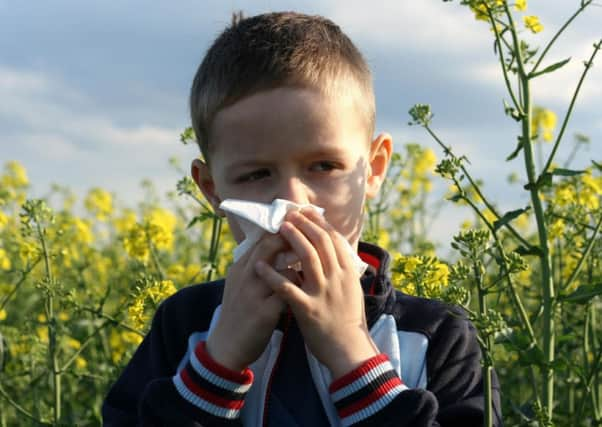FEATURE: Hayfever sufferer? Prepare yourself for the big sneeze...


The hay fever season has just started and rising pollen levels throughout the coming summer months will lead to misery for about 15 million people in the UK.
“I think this year the season will be moderate to severe in terms of pollen intensity,” predicts hay fever expert Dr Jean Emberlin, director of PollenUK.
Advertisement
Hide AdAdvertisement
Hide Ad“There’ll be bad days when people will suffer from our two main allergenic trees, birch and oak, particularly from birch which affects a quarter of sufferers, but I think it’s unlikely to be a catastrophically bad year.”
Pollen’s effect - generally, the higher the pollen count, the stronger people’s symptoms – is governed by the weather, she points out.
“Currently, there’s a north-south climate divide, with the north much more unsettled and wet, so although the pollen season has started in the south, it’ll probably be a couple of weeks before it begins in the north.
“Wet weather dampens down pollen and makes it difficult for it to enter the air.”
Advertisement
Hide AdAdvertisement
Hide AdIf birch and oak pollen seasons collide, because one starts later than normal, pollen levels can soar, but Emberlin isn’t expecting this combination of circumstances.
“There’s often a small overlap between birch and oak.
“This year, the birch has started around three weeks later than normal but I think the oak will also be a little later,” she says.
She forecasts from mid-May oak pollen levels could begin to rise, depending on region and weather, while the grass pollen season is likely to start in late May or the beginning of June.
Professor Roy Kennedy, a hay fever expert based at the University of Worcester, believes there’s a gloomier scenario ahead for sufferers.
Advertisement
Hide AdAdvertisement
Hide AdHe predicts a sudden pollen surge in June caused by the combination of the longer winter and the potential for an early summer. Although he expects England to fare worst, he says: “Scotland could see a condensed tree pollen season. Hay fever sufferers could be badly affected and need to be aware of this.
“The cold spring means a later start for pollen, with a pollen burst now in a condensed period, and the phenomenon of several pollens likely to peak at the same time. It means peak pollen levels will be early in the season, not later, as normal.”
Emberlin predicts, in a report on behalf of Opticrom Hay Fever Eye Drops, that the number of hay fever sufferers in UK will rise by a third to 20 million sufferers by 2015, and will more than double to 31.8 million by 2030.
Britain already has one of the highest rates of hay fever in the world, currently 25 per cent of the population, rising to 37 per cent in teenagers.
Advertisement
Hide AdAdvertisement
Hide Ad“Climate change in the next few decades will have a notable impact on people’s health, especially for hay fever sufferers,” she says. “In the future, hay fever hotspots will be concentrated around large urban areas, such as London and Birmingham, where up to 45 per cent of residents in those areas are set to suffer from hay fever in the next two decades.
“This is the result of higher pollution and urban climates, which facilitate longer pollen seasons.”